Psilocybin and LSD: What I learnt after experiencing 'psychedelic flashbacks'
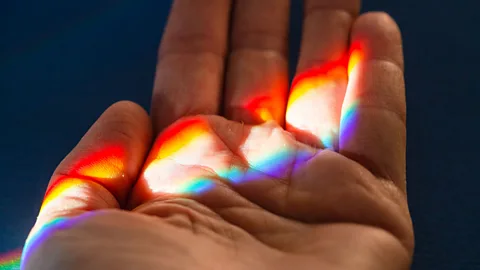 Getty Images
Getty ImagesWith psychedelic drug treatments accelerating towards approval in the US and elsewhere, Ed Prideaux investigates a disconcerting after-effect that is poorly understood.
I looked down at the driveway and noticed the paving stones were still moving. I'd taken the drug just the night before and hadn't slept, so I wasn't too surprised to start with.
This was eight years ago, and it was my fourth trip on 1-P LSD, an analogue of LSD that was purchasable online in the UK prior to a legal crackdown in 2016. I decided that this trip might be my last. Psychedelic space was "just a bit much", I concluded – and things thankfully seemed to settle to a delicate peace over the succeeding few days. That is, until I noticed some very strange events in my vision.
In the couple of weeks after the trip – completely sober – I saw the cupboards in my bedroom "breathing" and morphing. Carpets and chairs were covered in fine, greyish particles. Looking at friends' faces, my vision would tunnel in on their central visage like a high-definition camera, and with purple and greenish auras around their heads. The keys on my piano keyboard bore trims of rainbows. And leaning back in my chair one day, my visual field would saturate with dense pockets of blue, with bright halos formed around light fittings.
Having spent an evening watching the wallpaper breathe – glancing away and back and hoping it'd be stationary – I punched in an internet search. Quite quickly, I worked out what might be happening: psychiatrists call it Hallucinogen Persisting Perception Disorder, or HPPD. But a more colloquial term might be "psychedelic flashbacks": the persistence of psychedelic-like perceptual phenomena after the acute effects of a drug have worn off. Within the scientific community, HPPD has been considered to be relatively rare condition, but also one that is poorly understood.
You may also like:
More recently, I've been diving deeper into HPPD to try to understand it better. I've talked to many others who have reported the same symptoms, interviewed psychiatrists and researchers investigating HPPD's causes, and conducted a small research survey to capture people's reports about the personal and emotional consequences.
But my own experiences are not the only reason I've been motivated to investigate HPPD. With psychedelic drug treatments speeding towards approval, it's possible the condition could also become common. In recent years, psychedelics have been gaining mainstream attention around the world for their possible positive therapeutic effects. The state of Oregon in the US, for example, is "pioneering a therapeutic market" for psilocybin (magic mushrooms). And amid positive media coverage, the number of young people in the US consuming psychedelics has reportedly "soared". Around 9% of Americans aged 19-to-30 are estimated to have tried them in the last year, compared to 3% in 2011. (Read more: The worldview changing drugs poised to go mainstream).
So, what exactly is known about HPPD and why it happens?
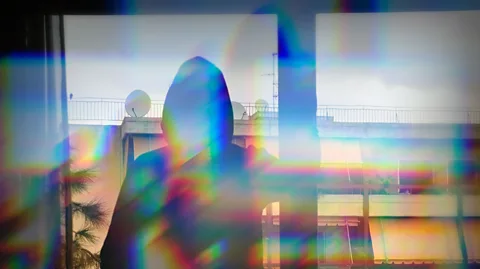 Getty Images
Getty Images
At present, researchers don't know exactly how common HPPD or flashback phenomena are, since psychiatrists in clinics only see those who are troubled by the effects. In 2011, an online questionnaire of just under 2,500 users of psychedelics (and other drugs) found that around a quarter reported at least one persistent visual on a constant basis, and 4% to the degree that they were contemplating medical help.
Scientists are also uncertain how HPPD works in the brain. The "disinhibition hypothesis" suggests that psychedelic drugs cause a "decoupling" of visual filters: the brain becomes less able to screen out visual noise. But MRI scans reveal that some people who report HPPD display no differences. Some suggest that HPPD may arise from the ways that psychedelics render the brain more neuroplastic and malleable, such that it "resettles" after a trip in an altered state. Since it's considered a mental health problem, though, HPPD can't be reduced solely to neurochemical processes in the brain: the individual person, their environment and relationships matter too.
We don't know precisely how long people's symptoms tend to last, either. For some, the effects may last a few weeks or months and fade away. Others live with them for a few years or even several decades. One tentative estimate of clinical HPPD patients suggests that 50% may recover within five years.
In my early urgent reading, I learned that medications can be limited: nothing curative, only addictive and side-effect laden benzodiazepines, repurposed anti-Parkinson's drugs, SSRIs, and antiepileptics, which may be life-savers for some, or have minimal or damaging effects for others.
At the time, this news was difficult to take. I took a screenshot of the HPPD Wikipedia page and messaged it to a friend I'd tripped with. "What have I done?" I thought.
Fortunately, the intensity and intrusiveness of my symptoms have declined markedly in the years since. But some degree of visuals is still present nearly a decade later.
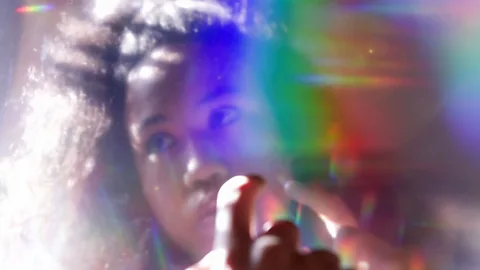 Getty Images
Getty ImagesI tried 1-P LSD in the first growth spurts of the "psychedelic renaissance": the resurgence of clinical and media interest in the potential of psychedelic and related drugs to provoke healing experiences. Since then, calls to decriminalise the drugs have only grown. This year, additional well-publicised evidence has emerged that MDMA may be helpful for the treatment of PTSD. Some US states have made moves to decriminalise psychedelics, and at the federal level, politicians such as Alexandria Ocasio-Cortez have sought to do the same (albeit unsuccessfully). Media headlines have attested without subtlety to psychedelics' potential to "free up the depressed brain", "erase trauma", or form "the Next Big Cure." Others, reporting on research surveys, give the impression that there's "no link between psychedelics and psychosis" or "mental health problems" in general.
However, at the same time, tentative population evidence suggests that adolescents who use psychedelics may be more likely to report depression and suicidal thoughts. A recent study (on which I was a co-author) conducted by the Challenging Experiences Project, an independent research group led by the philosopher Jules Evans, corroborated how psychedelic trips can traumatise and overwhelm individuals even without obvious vulnerabilities.
As for HPPD, not everyone is necessarily bothered if it happens to them – some people enjoy the experience – but psychiatrists I interviewed also describe how it can cause distress and impair quality of life.
Tomislav Majić, a psychiatrist at the Charité University Hospital in Berlin, Germany, who co-leads his hospital's psychedelic substances research group, says he regularly sees patients troubled by the effects of HPPD. "It's interesting that even some of the people intensively involved with psychedelic therapy and research hardly know about HPPD," Majić told me. "It is something that people prefer not to know."
Majić says that "HPPD is the most specific of the psychedelic-related disorders", but it sits among a suite of related problems whose prevalence and causes we don't yet understand: prolonged dissociative reactions, feelings of unreality, anxiety, and possibly PTSD from the overwhelming effects of a psychedelic trip.
Flashback history
While HPPD is a relatively new psychiatric diagnosis – only a couple of decades old – the link between psychedelics and prolonged perceptual changes has a longer history than many might realise. In 1898, the writer Havelock Ellis tried mescaline and noticed a pleasant rise in his sensitivity to "light and shade and colour". In the 1930s, the existentialist Jean-Paul Sartre likewise tried mescaline and developed zoomorphic visions of crabs that followed him for several years. Eventually, Sartre was able to adapt and derive meaning from his crabs, which he interpreted as psychic compensations for his fear of loneliness.
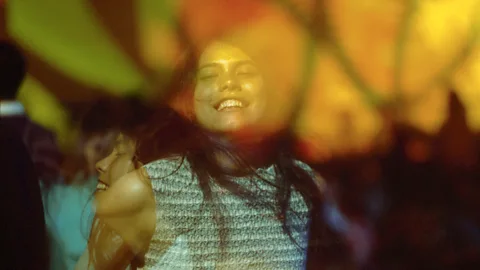 Getty Images
Getty ImagesIn the 1950s, researchers in the "first wave" of LSD therapy noticed some partial perceptual shifts among their patients. It seems that recurrent experiences like HPPD were not a serious problem – or perhaps didn't occur – among those first cohorts, but a lot of data proved unreliable or went ungathered. Transient perceptual changes were regarded as "relaxing and beneficial" by some subjects.
Public perceptions changed in the late-1960s, and stigma grew. Based in the Haight-Ashbury district in San Francisco – the epicentre of LSD culture on the American West Coast – the psychiatrist Mardi Horowitz coined the term "flashback". This word would take on a life of its own in lexica and competing propagandas around psychedelic drugs. Diane Linkletter, the daughter of a famous TV host, killed herself in the throes of an alleged LSD flashback, making national news (however, the claim that drugs were responsible for her death is false, according to the fact-check service Snopes).
It was many years before psychiatrists would diagnose flashbacks formally. In the early 1970s, Henry Abraham was a psychiatrist working in Boston when the seeds of the HPPD diagnosis were sown. "A steady stream of self-described casualties of LSD captured my interest", Abraham writes, describing a range of "perceptual, cognitive, and affective symptoms". Abraham documented a consistent set of perceptual changes that remains continuous with reports today: overlays of visual static, "after-images", patterning, flashes of light and colour.
In 1987, psychiatrists described the experience as "Post-hallucinogen Perception Disorder" within the third Diagnostic and Statistical Manual of Mental Disorders (DSM III), the so-called "psychiatrist's bible". In 2000, it was named HPPD in DSM IV. And in 2002, a distinction would emerge in the literature between "Type-1: HPPD – episodic flashback experiences – and "Type-2", which describes a recurrent perceptual disorder.
Clinical causes
In the present day, full-blown HPPD has not yet been reported in psychedelic clinical trials. One reason might be because clinical drugs are pure and unadulterated, unlike street drugs. Between 2011 and 2017, the rate of adulteration with so-called "novel psychoactive substances" (NPS) in Dutch street drug samples increased from 0.5% in 2007 to 7.6% in 2017. HPPD reports may also be explained by the degree of aftercare and support in research studies, since the condition may be more likely with challenging trips. Scientists also screen people based on personal and family history of mental illness, which may reduce the risk.
However, a 2022 review of psychedelic trials found that adverse events (which would include HPPD) were sometimes improperly defined in studies, and probably underreported. And some trial participants, have experienced transient "flashback" phenomena that they described as unbothersome.
Janis (not her real name) participated in a private Canadian trial of psilocybin – the active ingredient in magic mushrooms – for treatment-resistant depression. She noticed antidepressant effects with each dose, but also significant spikes in anxiety, alongside some novel visuals. After the trial, Janis describes developing full-blown HPPD and dissociative effects following two further therapeutic psychedelic sessions, including with legal ketamine infusions and an "underground" guide with psilocybin.
 Getty Images
Getty ImagesOthers with experience like Janis's largely self-organise themselves in online patient communities. HPPDOnline.com, the support forum, numbers more than 18,000 people in its users; the HPPD subreddit includes around 12,000; and an assortment of other groups on Facebook have more than 10,000 members. A cursory review reveals a striking wealth of bad stories: suicides, depressions, ignorance from doctors, the frantic sampling of supplements, misdiagnoses.
However, not all of these reports may be describing HPPD. The symptoms people describe on online communities have swelled beyond psychedelic kinds: with reports as disparate as organ pain, head pressure, floaters, balance problems, stammering, all and any of which may bear as much relation to anxiety and symptom fixation as the organic effects of a trip gone wrong.
Strikingly, Majić has found that many people who report HPPD in his clinic do not, on close examination, really meet criteria for the disorder: the kinds of visuals they consider aberrant may be normal things like floaters and light static in the dark, to which they're now more attuned since their trip and the surrounding anxiety.
One problem that has followed HPPD is providing an adequate definition. Other drugs than the classic hallucinogens also seem to prompt HPPD-like symptoms, including SSRIs, cannabis and MDMA.
Psychiatrist Dominic ffytche at King's College, London, who sees HPPD patients in his clinic, suggests that HPPD would be best grouped on a spectrum of "serotonergic syndromes", in which changes to serotonin (fostered by psychedelics as well as other drugs) together create visuals and spikes in anxiety that coalesce.
For Sophia Alcala, who moderates the HPPD subreddit and has run peer-support groups for the condition, one rule-of-thumb for people concerned is to wait a month after a trip to check on their visuals. Indeed, it's relatively normal for transient visuals to occur after an experience.
In a 2022 paper, researchers also warned that encountering the HPPD concept shortly after a trip can be raise the likelihood of experiencing it. Psychedelics can increase user suggestibility for extended periods, so people can falsely conclude they "have" the disorder and become greatly distressed.
Range of experience
Despite all these diagnostic challenges, I wanted to get a clearer picture of people's subjective experiences. So, as part of a Master's programme earlier this year, I conducted a survey of 830 self-selected people who claimed to have experienced HPPD. My goal was to focus on the distress that accompanies their symptoms, as opposed to the mere experience of unbothersome visual phenomena. I found that just under a quarter were impaired or very impaired by their HPPD symptoms – anxious, scared, exhausted – while around a third weren't impaired at all.
Three-quarters of the more impaired were often worried that they have "brain damage". More than 60% of the very impaired believed it was "probably or definitely true" that others will judge them because their condition was created by "illicit drugs". And more than half of the most impaired believe they can never talk to anyone about the condition.
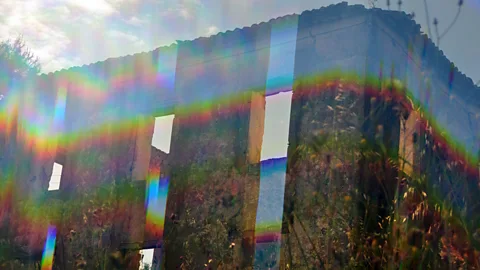 Getty Images
Getty ImagesWhen I developed HPPD symptoms, I told a few other people, but they didn't really get it, nor offer support. I didn't feel comfortable sharing with my family, and because I was in college at the time, I avoided telling anyone in authority: I would have been expelled. It took five years to "come out" to my closest loved ones. Others never do.
Around 60% of the most impaired in my survey worry often or very often that they're "going insane". Indeed, the fear that one has developed schizophrenia is "extremely common" in the community, according to Alcala, the moderator of the HPPD subreddit. Amid deteriorations in stigma towards schizophrenia over the last three decades, the naked fact of "seeing things" can activate culture-bound fears of being "crazy". It is indicative that there may be fewer (or no) cases of clinical HPPD among Navajo Native American users of peyote, whose culture is more accepting of psychedelics than ones in which the drugs are criminalised.
Gerard Alderliefste, a physician based in the Netherlands who specialises in addiction and has seen dozens of HPPD cases, says he can reassure patients they don't have schizophrenia, but he's noticed that a different "catastrophic" fear can take its place. Why? Alderliefste believes that HPPD's root causes lie beyond drugs. He takes a trauma-centred perspective, in which good and bad trips alike may flood their subjects with strengths of emotion and losses of control for which restrictive childhoods had left them ill-prepared. Such a combination is ripe to make HPPD sufferers hyper-alert and vigilant, always on the lookout for perceived danger in their visuals and symptoms.
For the cognitive scientist Marta Kaczmarczyk, who works with the Psychedelic Society of the Netherlands, one way to think about HPPD is through the body's stress response. Boosting cortisol, heart rate and body temperature, psychedelics could overstimulate the nervous system and lead to forms of "burnout" – producing fatigue, dissociation, anxiety, tinnitus, depression, and other symptoms often associated with HPPD.
Torsten Passie, a professor of psychiatry at Hanover Medical School, a world expert on hallucinogens and HPPD, suggests that HPPD and flashbacks are more likely with particular personality profiles: ones high in absorption, deep imagination, and dissociation, and who may have noticed some visual phenomena before they ever took drugs.
For some, treating HPPD may be a matter of retraining one's attention in a careful and iterative process. Indeed, some case reports show that cognitive-behavioural treatments – challenging destructive thoughts, learning to be less fixated on symptoms – can relieve both distress and the intensity of people's visuals to the point of total resolution.
HPPD and flashbacks remain mysterious. It's not yet clear whether the "psychedelic renaissance" and rising use will create spikes in HPPD reports. But for those who do develop such symptoms, it's possible that falling stigma and rising acceptance of the potential of psychedelics will create less isolation and fear. The psychosocial factors that surround the symptoms are key.
Looking back years later, I wish I could tell my younger self to be more cautious. But also to let them know – and indeed anyone currently in HPPD's throes – that recovery is possible.
*Have you experienced persisting visual effects? If you’d like to talk to someone, the non-profit Perception Restoration Foundation has published a list of professionals based around the world.
--
If you liked this story, sign up for The Essential List newsletter – a handpicked selection of features, videos and can't-miss news delivered to your inbox every Friday.
